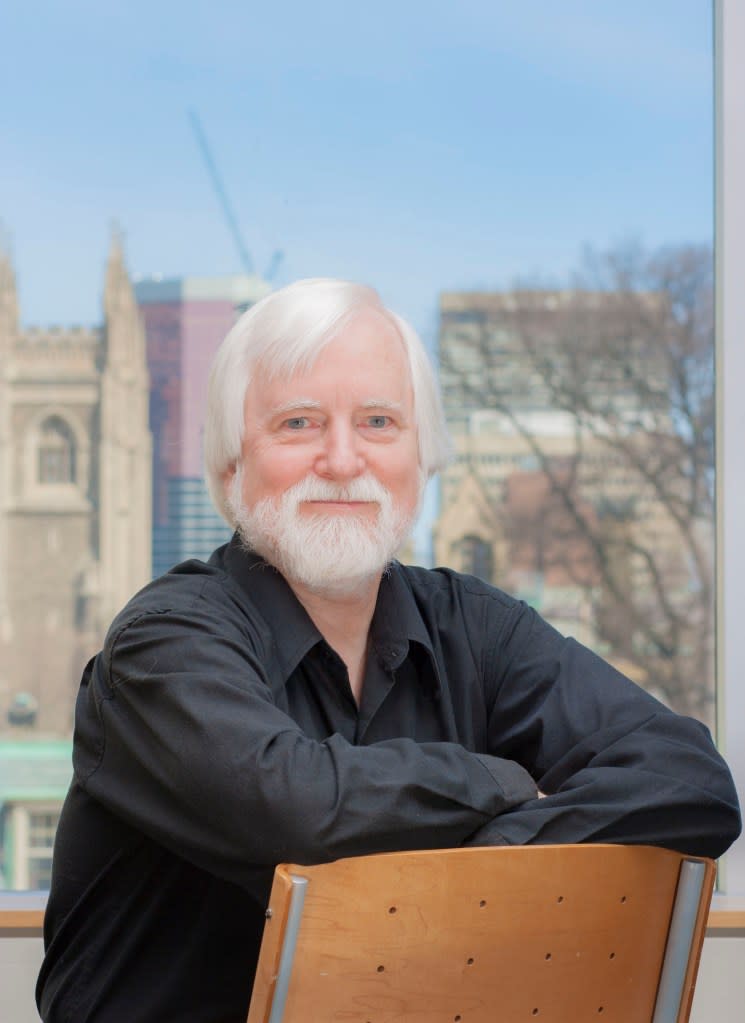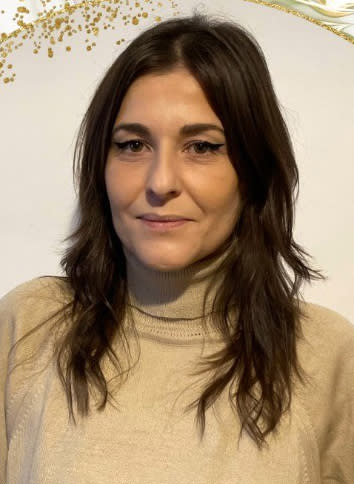Fox News’ Jesse Watters has surprising explanation for getting under the skin of radicals to understand their extreme views

- Oops!Something went wrong.Please try again later.
When he interviewed people for his man-on-the-street segments, Fox News personality Jesse Watters typically only got to talk to them for 10 minutes at most. Now that he’s a primetime host, he has even less time to get into it with interview subjects.
That fact inspired his new book “Get It Together: Troubling Tales from the Liberal Fringe” (Broadside Books, Tuesday).
“I wasn’t getting close to the core: Why do people believe things? How did they end up with their worldviews? What gave them these radical ideas?” he writes.

“I set out looking to interview out-of-the-mainstream Americans. Not debate them, just listen to their life stories. I’d listen for two hours, three hours, sometimes four. What I found was that their maverick ideology was rooted in personal struggle. I’d always assumed someone’s political belief system was based upon the books they’d read or the media they’d consumed. Not entirely. A big factor in a person’s policy preference or political identity? Formative experiences in their youth.”
He writes that “many of the characters I interviewed for this project had experienced drugs and alcohol early” and “almost all of them had disastrous parents.”
The resulting book is divided into 22 chapters, each focusing on a extreme leftist and looking at not just what they believe but how they came to believe it. Have a look at three in this excerpt:
THE OPEN BORDERS PROFESSOR
Joe Carens, a political science professor at The University of Toronto, is described as “one of the world’s leading political philosophers on the issue” of immigration. His book “The Ethics of Immigration” is popular in academic circles (meaning nobody’s read it). But I read one of his essays. Joe argues, “borders should generally be open and people should normally be free to leave their country of origin and settle wherever they choose . . . On what moral grounds can we deny entry to these sorts of people? What gives anyone the right to point guns at them?”
Joe’s guiding principle — a constant refrain throughout our conversation — is fairness. He longs for a world that’s fair. “What I try to say is, look, if we find ourselves in a world, we have to reflect upon whether we think the institutions that exist, however they came about — are these just or fair or are they not? And if they’re unfair, we should try to change them to make them fairer. So that should be the question. The world you find yourself in, you didn’t create it no matter who you are, but you have to decide whether you’re going to perpetuate it or change it.”

I have a hunch something happened to Joe. That something might be why he’s focused on fighting unfairness.
I take a shot. “Were you ever molested as a child?”
“I’m not one hundred percent sure. I think I was sexually abused. I do think that happened, but I don’t have clear memories. I’ve been in therapy, so it’s not something I can point to. This happened to me at this time, but it did affect my stance in the world, I think.” A Catholic priest is “one possibility, but I haven’t got the specifics about it,” he tells me. “So it could have been a family thing. I’m sure it wasn’t my father, but there was an uncle who’s a possibility. I’m not sure. I do think it was probably connected to that because I have a psychological aversion to being in Catholic churches. That makes sense, psychically, in that connection.”
A renunciation of God after an alleged assault inside of a Catholic church would explain a yearning desire for fairer institutions. A fair institution would protect the most vulnerable. Babies are vulnerable. Was Joe molested as a baby? Who else is vulnerable? “Your tired, your poor, your huddled masses.” His striving for strong institutional protection under the banner of universal amnesty makes sense in the repressed memory of an alleged Catholic Church-related child sexual assault.

When people experience trauma, they often remove themselves from reality. It’s too painful. They have to detach to protect themselves. Joe’s aversion to the unfairness of the here and now; his preference for abstract possibility over practical reality; and his focus on what could be over the nature of what is are all functions of a man who finds comfort in a world of dreams, rather than the world as it is. It’s a compelling dream, in the final analysis. But it remains just that—a dream.
THE TOAD SMOKER
Everyone has their vices — booze, tobacco, prostitutes, chocolate, gambling, online shopping.
Then there’s Hector. He smokes toad venom and comes face-to-face with death itself. To be fair, Hector doesn’t consider smoking it a “vice.” Yeah, he smokes toad, but he also serves as a spiritual guide for others who want to try it. You don’t actually smoke the toad itself. You smoke the toad’s psychedelic secretion.
This drug isn’t “chill.” It can be terrifying: the small fishing tribes in Mexico who cultivate the “medicine” consider the toad the “God of the underworld.”

“It sounds pretty hefty when you say it like that, but the reason they say that is when you pray with the toad, when you take the toad, you’re briefly allowed to experience the afterlife for a few brief moments, and you come back,” Hector says. The whole process lasts just fifteen to twenty minutes, but it can feel like an eternity.
“It stops your ego from thinking. It literally stops your neurons from firing. So, it’s like your brain’s not working correctly. Your consciousness leaves your body. And then once the effects start to wear off and your brain starts to fire again, that’s when you come back.”
It appears as though Hector’s been dealing with demons his whole life. Also LSD. And “a little bit of heroin … I just went on this whole thing and just trying to alter my conscience to where I didn’t have to quite feel everything.” Probably because he was molested by a guy in a trailer park when he was younger. Hector was born premature. “I wasn’t supposed to live. I was hooked up in an incubator for months and months and months. I’ve gone through a lot of trouble. When I was eighteen, doing a lot of those drugs, man, I had my ass beaten. I almost died. I got a titanium plate in my face. My cheek is titanium, and I’ve been through a lot of stuff.”
“Who hit you?”
![“It appears as though Hector’s [not pictured] been dealing with demons his whole life,” Watters writes. Provided by Jesse Watters](https://s.yimg.com/ny/api/res/1.2/ZvMkcCfeJJKFQut4F3JAkQ--/YXBwaWQ9aGlnaGxhbmRlcjt3PTk2MDtoPTcyMA--/https://media.zenfs.com/en/ny_post_articles_869/3f0fdca2197a01da5811b72dc6e44809)
“I was passed out drunk on a porch after a house party, and one of [my friends] came through and slapped me and then they left. Well, I sobered up and I used to fight a lot. I was like, ‘Whoever hit me, come back. We’re going to fight.’ Four of them showed up and I got my ass beaten.”
“Never fair.”
“Yeah,” he says. “I don’t talk crap to anybody anymore. Also, I don’t know my dad at all. He abandoned me. He has children with other women after me, and they’re present in his life, but I found out that his whole family’s from indigenous Mexico right around the same area where these toads are from. So, it’s basically my blood.”
“Have you reached out to him since?” I ask.
“Yeah,” Hector says. “I’ve talked to him. He doesn’t really want quite much to do with me.”
THE ANTI-NATALIST

Alexandra Cuc is an anti-natalist.
“I will never have kids. And I don’t think others should have children as well.”
She runs an organization, Stop Having Kids, and passes out condoms on weekends.
Most anti-natalists are motivated by environmental concerns — ecological destruction caused by overpopulation, human contributions to climate change, and so on. But for Alexandra Cuc, it’s deeper than that. “Even if the climate was in decent shape, I would still be an anti-natalist.”
She’s had her tubes removed. She even made her boyfriend get a vasectomy. She got pregnant when she was nineteen and had an abortion.
“I felt a lot of relief.”

Alexandra lives in Canada. She was born in Romania. She claims her mother did a number on her, and her grandmother did a number on her mother. “Living through communism, there was that scarcity mindset. My mom never felt like she could really get what she wanted.” Her grandmother wouldn’t even buy her mother a dress. “So with me, she basically gave me absolutely everything that I ever wanted.” But her mom had “that coldness,” which she got from her grandmother. Communication was lacking. “So when my grandma found out that my mom was pregnant, which my mom hid from her, my grandma just stopped talking to her. They lived in the same apartment building, but my grandma was furious. She didn’t talk to my mom. Even when I was born, my grandma wasn’t there. My grandma wanted nothing to do with my mom or me as a little baby for, I think, six or seven months of my life.”
She was “really colicky.” Still not an excuse. But this was tough on the family. Her parents were young, in college, working, not sleeping. “It was a huge struggle for them.”
People have issues. And these issues are getting bigger … and crazier. And because the way society is now wired — the internet combined with a strain of political correctness — everything is fair game. But we can’t pay the price for your problems. You don’t need to pay me back for your suffering because I nothing to do with it. How to fix it? Here’s a start: just be better than your parents. For most of you, that’s easy.
Adapted from the Get It Together: Troubling Tales from the Liberal Fringe by Jesse Watters. Copyright © 2024 by Jesse Watters. Published by Broadside Books, an imprint of HarperCollins Publishers. Excerpted by permission.

